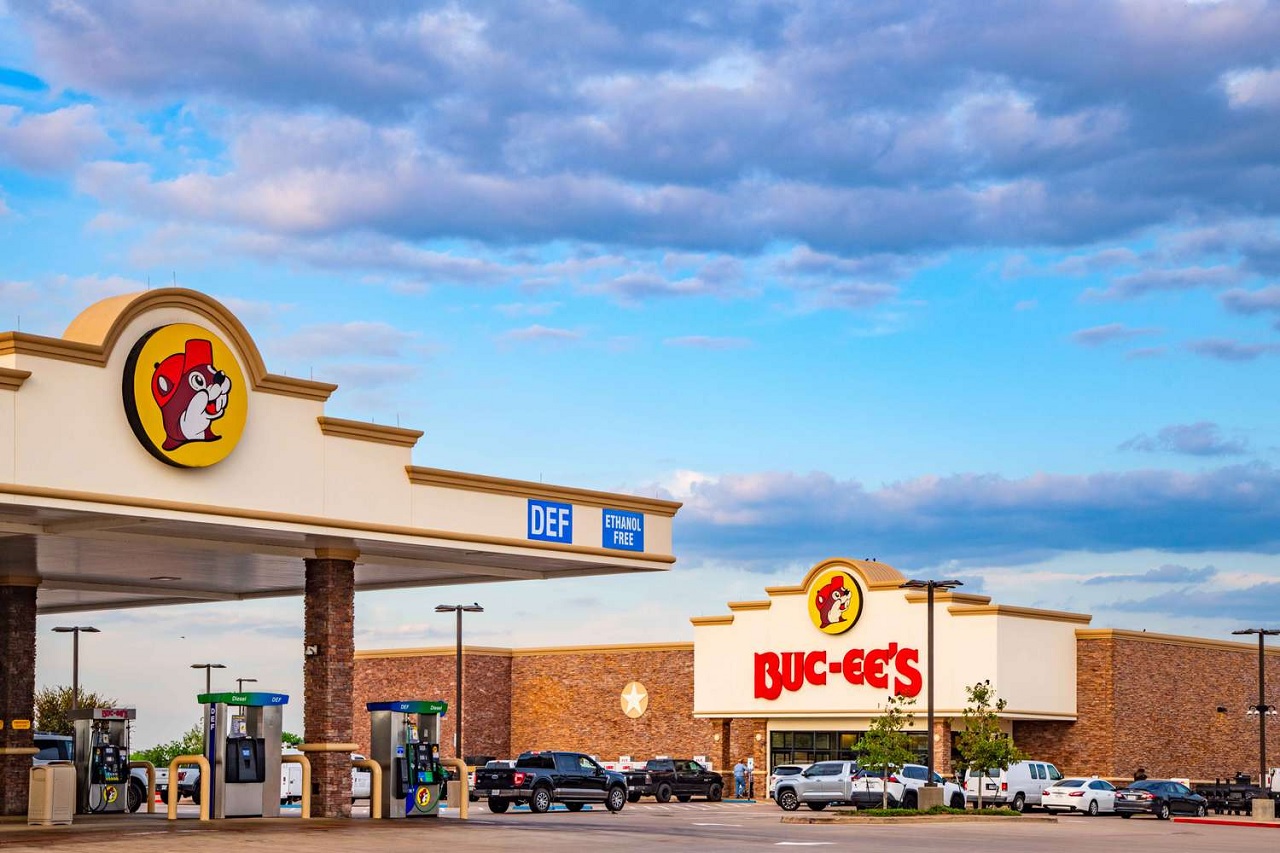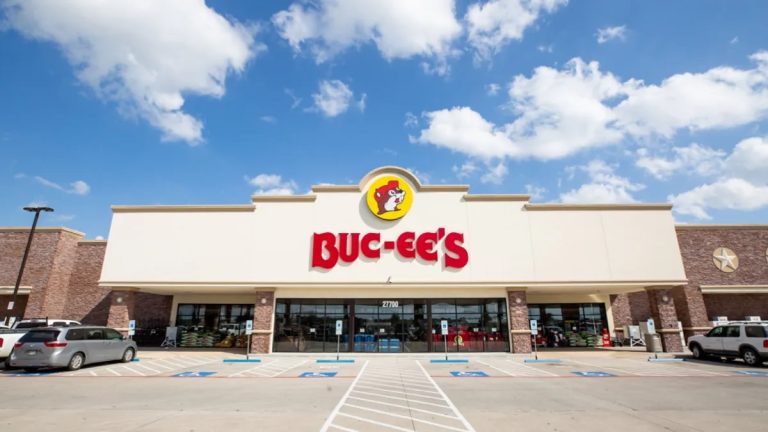How Much Does A Buc-ee’s Franchise Cost? Definitive Guide
Unfortunately, you can’t franchise a Buc-ee’s store. All existing locations are company-owned, making the cost of a franchise less straightforward. Buc-ee’s stands out with its expansive, customer-friendly design, diverse menu, and efficient customer flow. They’re open 24/7, providing convenience that’s great for both locals and travelers.
If you’re interested in similar investment opportunities or want to explore what makes Buc-ee’s business model so appealing, there’s a lot more information to explore.
The Basics of Opening a Buc-ee’s

Opening a Buc-ee’s involves understanding several key requirements and steps to get started. First, you’ll need to focus on the store layout. Buc-ee’s stores are known for their expansive and customer-friendly designs. Make sure you plan for wide aisles, ample product displays, and a clean, inviting atmosphere.
Next, consider the menu variety. Buc-ee’s offers a wide range of items, from fresh-made food to unique snacks and beverages. Ensuring a diverse menu will attract a broad customer base and keep them coming back.
Customer flow is another critical factor. Design your store to facilitate easy movement for customers, from the entrance to the checkout. Efficient customer flow minimizes congestion and enhances the shopping experience.
Don’t forget about loyalty programs. Implementing a robust loyalty program can encourage repeat visits and boost sales. Buc-ee’s fans love to rack up points for discounts and special offers.
Lastly, think about your operating hours. Buc-ee’s stores typically operate 24/7, providing convenience to travelers and locals alike. Being open around the clock requires careful planning but can significantly increase your revenue potential.
Possible Costs Involved

When you’re considering the costs of opening a Buc-ee’s franchise, you’ll need to account for several key expenditures. These include the franchise fee, real estate and construction, equipment and inventory, marketing and advertising, and employee hiring and training. Each of these elements plays an essential role in your overall budget.
Franchise Fee
Considering the potential costs involved, the franchise fee for Buc-ee’s can be a significant investment. When you decide to open a Buc-ee’s franchise, you’ll encounter several expenses that are essential for the establishment and operation of your business. The initial fee is just the beginning, as it covers your entry into the franchise system and the rights to use the Buc-ee’s brand.
You’ll also need to sign a franchise agreement, which outlines the terms and conditions of your partnership with Buc-ee’s. This agreement guarantees that you adhere to the brand’s standards and licensing requirements, which are vital for maintaining the consistency and quality Buc-ee’s is known for.
Take note of these critical factors involved in the franchise fee:
- Initial fee: The upfront payment granting you the franchise rights.
- Franchise agreement: Legal document detailing your responsibilities and obligations.
- Licensing requirements: Standards and regulations you must follow.
- Brand usage: Guidelines on how to properly use Buc-ee’s branding and trademarks.
Additionally, be prepared for ongoing royalty fees, which are a percentage of your sales paid to Buc-ee’s for continued support and brand association. Understanding these costs will help you gauge the financial commitment required to join the Buc-ee’s franchise family.
Real Estate and Construction
After understanding the franchise fee structure, it’s essential to consider the real estate and construction costs involved in setting up your Buc-ee’s location. The first step is the vital process of location selection. You’ll need to find a site that not only attracts high traffic but also meets Buc-ee’s size requirements. Keep in mind that prime real estate usually comes at a premium.
Next, pay close attention to zoning regulations. Local laws will dictate what kind of business can operate in specific areas, so make sure your chosen location complies. This can save you from costly legal challenges down the road.
Once you’ve secured a location, the construction timeline becomes an important factor. Delays can be expensive, so work closely with contractors to stick to deadlines. Building permits are another fundamental component. Acquiring these can be time-consuming, so start early to avoid setbacks.
Lastly, consider lease agreements if you’re not purchasing the property outright. Long-term leases can offer stability but might require significant upfront costs. All these elements—location selection, zoning regulations, construction timeline, building permits, and lease agreements—are essential to factor into your budget when planning your Buc-ee’s franchise.
Equipment and Inventory
Equipping your Buc-ee’s franchise with the necessary tools and inventory is a significant investment that demands careful financial planning. You’ll need to take into account various factors to guarantee your store operates smoothly and efficiently. Equipment costs can be substantial, spanning everything from kitchen appliances to shelving units and point-of-sale systems. Proper inventory management is essential to keep track of stock levels and minimize waste.
Here’s a quick rundown of possible costs and considerations:
- Bulk Purchasing: Buying in large quantities can reduce costs but requires significant upfront capital.
- Vendor Selection: Choosing reliable vendors is pivotal for ensuring consistent supply chain operations.
- Equipment Maintenance: Regular maintenance can extend the lifespan of your equipment, saving money in the long run.
- Inventory Management: Investing in software to monitor stock levels can help prevent overstocking or stockouts.
Keep in mind that your initial inventory will include a wide range of products, from snacks and beverages to branded merchandise. Proper planning and smart purchasing strategies can help you manage these expenses effectively. Always account for unforeseen costs and have a contingency budget to cover any unexpected issues. Ensuring a well-stocked and efficiently run store will be key to your franchise’s success.
Marketing and Advertising
Marketing and advertising your Buc-ee’s franchise effectively can be a game-changer for attracting customers and driving sales. Building brand awareness is essential, and you’ll need a solid advertising budget to reach your target audience. Social media platforms like Facebook, Instagram, and Twitter are indispensable tools for promoting your franchise. They allow you to engage directly with potential customers and create buzz around your store openings, special promotions, and unique products.
Promotional strategies should be tailored to your target audience. For instance, you might want to offer exclusive discounts or host local events to draw in crowds. Digital advertising, including sponsored posts and pay-per-click ads, can help you reach a broader audience quickly. Don’t forget about traditional advertising methods like billboards, radio spots, and local newspaper ads, as they can complement your online efforts.
Allocating a portion of your advertising budget to market research can pay off in the long run. Understanding consumer behavior and preferences will enable you to craft more effective campaigns. Overall, effective marketing and advertising require a balanced approach, combining both digital and traditional methods to maximize your reach and drive traffic to your Buc-ee’s franchise.
Employee Hiring and Training
As you’re gearing up to attract customers through effective marketing and advertising, it’s equally important to focus on the hiring and training of your employees, which can incur significant costs. Ensuring your team is well-prepared and motivated is vital for the smooth operation of a Buc-ee’s franchise. The hiring process is the first step, where you’ll need to invest time and resources in finding the right candidates.
Consider the following potential costs:
- Employee onboarding: This initial phase involves paperwork, orientation, and introducing new hires to company culture.
- Training modules: You’ll need thorough materials and programs to cover all aspects of job duties, from customer service to safety procedures.
- Training duration: The time it takes to train employees can vary, but you’ll need to pay wages during this period, even though employees aren’t fully productive yet.
- Employee benefits: Offering competitive benefits can attract top talent but also adds to your overall costs.
What Makes Buc-Ee’s Model Attractive To Business Owners?
Buc-ee’s unique blend of extensive product offerings and exceptional customer service makes it an enticing model for business owners. One of the key factors driving its success is customer loyalty. People come back repeatedly because they know they can count on a consistently excellent retail experience. This loyalty is further fueled by Buc-ee’s unique merchandise, which ranges from quirky branded items to high-quality snacks you can’t find elsewhere.
Moreover, Buc-ee’s brand reputation is unparalleled in the convenience store industry. It’s known for its clean facilities, friendly staff, and an overall positive shopping experience. This strong reputation draws high traffic, ensuring a steady stream of customers throughout the day. The high footfall, in turn, creates more opportunities for sales and boosts profitability.
Additionally, Buc-ee’s offers an all-encompassing retail experience. With its massive stores, you’re not just running a gas station; you’re managing a mini-mart, a gift shop, and a food court all rolled into one. This multifaceted approach appeals to a wide range of customers, making it a versatile and resilient business model. For these reasons, Buc-ee’s stands out as an attractive opportunity for aspiring business owners.
Exploring Similar Franchise Opportunities
When you’re exploring similar franchise opportunities, it’s vital to compare the initial investment and ongoing costs. You’ll want to understand how these financial requirements stack up against Buc-ee’s. This way, you can make an informed decision about which franchise offers the best return on investment.
Initial Investment and Costs
Frequently, potential franchisees are curious about the initial investment and costs associated with similar franchise opportunities. Understanding these costs is essential for making informed decisions. Here’s a quick look at some key elements you’ll need to take into account:
- Operational Expenses: From initial setup to ongoing business needs, operational expenses can vary widely depending on the franchise. You’ll need to budget for equipment, inventory, staffing, and day-to-day operations.
- Licensing Requirements: Different franchises have unique licensing requirements that can impact the total initial investment. Be sure to factor in these fees, which can range from local business licenses to more specialized franchise-specific permits.
- Insurance Policies: Protecting your investment is crucial. Varied insurance policies, including liability, property, and business interruption insurance, are necessary and can have a significant impact on your initial costs.
- Financial Planning and Legal Considerations: Proper financial planning is important. You’ll need to work with financial advisors and legal experts to make sure you meet all regulatory and contractual requirements. This step often involves initial legal fees and ongoing consultation costs.
Ongoing Costs
Managing the ongoing costs of a franchise requires a keen understanding of various recurring expenses and their impact on your bottom line. For instance, utility bills can fluctuate monthly, and it is crucial to budget for these changes to avoid surprises. You’ll also need to account for maintenance fees, which cover the upkeep of equipment and facilities to ensure smooth operations. These fees might seem small individually, but they can add up over time.
Insurance premiums are another critical expense. They protect your investment from unforeseen events, but it’s vital to shop around for the best rates to keep costs manageable. Lease payments for the property can be one of the largest ongoing costs, so negotiating favorable terms from the outset can save you significant money in the long run.
Don’t forget about software subscriptions, which are necessary for managing various aspects of your business, from accounting to customer relations. While these subscriptions might seem minor compared to other expenses, they are indispensable for streamlined operations. By keeping a close eye on these ongoing costs and regularly reviewing them, you’ll guarantee your franchise remains financially healthy and profitable.
Alternative Franchise Options
If you’re thinking about alternatives to a Buc-ee’s franchise, several other promising franchise opportunities might catch your interest. Exploring different franchises can offer unique franchise benefits, strong brand recognition, and the potential for substantial business growth. Conducting a thorough market analysis will help you identify the best fit for your goals and resources. Plus, many franchises provide extensive operational support to guarantee your success.
Here are a few alternative franchise options to explore:
- 7-Eleven: With its extensive brand recognition and established customer base, 7-Eleven can be a lucrative choice. The company offers robust operational support and a proven business model.
- Subway: Known for its global footprint and healthy eating options, Subway offers franchisees the benefit of brand recognition and a steady stream of health-conscious customers. Their market analysis and training programs are excellent.
- Dunkin’: If you’re interested in the coffee and baked goods market, Dunkin’ offers great franchise benefits, including a loyal customer base and thorough operational support.
- McDonald’s: As one of the world’s most recognized brands, McDonald’s provides unparalleled brand recognition and a strong framework for business growth. Their detailed market analysis and support systems are exceptional.
Exploring these options can help you find the perfect franchise to match your aspirations.
Who Owns Buc-ee’s Franchise?
While considering various franchise opportunities, it’s important to know that Buc-ee’s is not a franchise but a privately-owned chain. The ownership structure of Buc-ee’s is unique compared to many other businesses you might be considering. Founded by Arch ‘Beaver’ Aplin III and Don Wasek in 1982, the company has remained a private entity, closely held by its founders and their families. This setup allows them to maintain a firm grip on the company’s direction and vision.
The founders’ vision has always been to provide an exceptional convenience store experience, complete with clean restrooms, a wide array of merchandise, and high-quality customer service. As a private company, Buc-ee’s corporate leadership can make prompt decisions without the need for franchisees’ input, ensuring that their business philosophy remains consistent across all locations.
With its centralized control, Buc-ee’s can uphold the high standards that have made it a beloved brand. This approach also guarantees that any expansion aligns perfectly with the founders’ original goals and values. If you’re interested in the Buc-ee’s model, it’s vital to understand that its success is deeply rooted in its unique ownership structure and unwavering commitment to its founding principles.
Is Buc-ee’s Planning To Franchise In The Future?
Buc-ee’s has no plans to franchise in the foreseeable future. The company’s corporate strategy is firmly rooted in maintaining full control over its operations. This decision aligns with their unique business model, which emphasizes high standards and a consistent customer experience across all locations. Let’s explore why franchising isn’t on the horizon for Buc-ee’s:
- Corporate strategy: Buc-ee’s prioritizes quality and consistency, which could be compromised by franchising.
- Expansion plans: Rather than franchising, Buc-ee’s prefers to open new stores under corporate ownership to guarantee uniformity.
- Market analysis: They’ve found that controlled, strategic expansion yields better returns than rapid, widespread franchising.
- Franchising obstacles: Leadership has identified numerous challenges, such as maintaining operational standards and brand integrity, which deter them from pursuing a franchise model.
Leadership decisions are heavily influenced by these factors, and Buc-ee’s believes that the potential risks of franchising outweigh the benefits. This approach allows them to sustain their reputation for excellence and customer satisfaction. So, if you’re dreaming of owning a Buc-ee’s franchise, it’s best to explore other opportunities, as the company’s current and future plans don’t include franchising.
Frequently Asked Questions
What Are the Average Annual Earnings of a Buc-Ee’s Store?
When considering the average annual earnings of a Buc-ee’s store, you’ll find that revenue distribution varies with seasonal trends. Profit margins are generally high due to bulk sales and efficient operations. Customer demographics, including road-trippers and locals, greatly impact sales forecasts. Typically, stores see increased revenue during holidays and vacation seasons, ensuring a robust annual earning. Keep these factors in mind when evaluating Buc-ee’s financial performance.
How Does Buc-Ee’s Ensure Quality Across All Its Locations?
Buc-ee’s maintains quality across all its locations through rigorous quality control and strict operational standards. They uphold brand consistency by conducting regular supplier audits and closely monitoring customer feedback. Each store adheres to the same high standards, ensuring that every product meets Buc-ee’s expectations. By prioritizing these elements, Buc-ee’s guarantees that whether you’re visiting in Texas or elsewhere, you’ll always experience the same exceptional service and products.
Are There Any Specific Regional Requirements for Opening a Buc-Ee’s?
When considering opening a Buc-ee’s, you’ll need to look into regional demographics to make sure there’s a strong customer base. Zoning laws and regulatory compliance are essential, as they can vary greatly by location. Conduct a thorough market analysis to understand local competition and demand. Meeting specific regional requirements is vital to guarantee your Buc-ee’s operates smoothly and successfully in the chosen area.
What Is the Employee Training Process at Buc-Ee’s?
When you start at Buc-ee’s, you’ll go through a thorough orientation program to get familiar with the company culture. You’ll complete various training modules to understand your role better. Employee mentoring is a significant part of the process, ensuring you have someone to guide you. You’ll also attend skills workshops focused on customer service, ensuring you’re well-prepared to provide the best experience for customers.
How Does Buc-Ee’s Handle Supply Chain Management?
You’re curious about how Buc-ee’s handles supply chain management. They focus on logistics efficiency by carefully selecting vendors and employing advanced supply chain technology. Their inventory management guarantees products are always in stock, while transportation coordination ensures timely deliveries. Buc-ee’s meticulous approach to vendor selection and their use of cutting-edge technology streamline operations, making their supply chain robust and reliable.
Conclusion
To sum up, contemplating a Buc-ee’s franchise might sound appealing, but it’s currently not an option since they don’t franchise. However, exploring similar opportunities can be worthwhile. Keep an eye on Buc-ee’s future plans, as their successful model could potentially open up franchising avenues someday.
Meanwhile, you’ve got plenty of alternative franchise options to ponder that might align with your business goals. Stay informed and ready to seize the right opportunity when it comes along.





Buc-cee’s has decent snacks, great coffee, but they never can beat Murphy USA in cigarette or gasoline prices